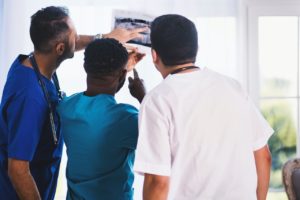Data are critical to closing the gap in malaria diagnosis and treatment
In 2023, there was an estimated 263 million new cases of malaria and 597,000 deaths globally, 95% of which were in Africa. Unfortunately, many malaria-endemic countries still lack the real-time data infrastructure required to collect, store, analyze, and share timely, accurate information on cases, vector populations, treatment availability, and intervention coverage. Instead, health systems have often relied on paper-based reporting and infrequent surveys – many of which have lost their donor funding. With rising threats like drug resistance and climate-driven transmission shifts, sustainable approaches to collecting more real-time data can become a frontline tool in the response.
Innovators are building new tools to accelerate progress in malaria care—Sproxil shows what’s possible
Sproxil, a social enterprise active in Nigeria, Kenya, and India, has a long tradition of deploying digital tools to tackle medicine counterfeiting and generate real-time health insights via SMS. In 2020 alone, over 18 million Nigerians used Sproxil’s authentication service. By scratching a label to reveal a unique code and texting it to a short number, users can confirm whether the drug is genuine, reducing the circulation of counterfeit antimalarials, which are frequently targeted by counterfeiters.
But Sproxil’s impact goes further. Beyond verification, Sproxil collects over 500 indicators across public and private channels—including diagnosis methods, medicine pricing, and care-seeking behaviors. These surveys, which patients opt into, are timestamped and geolocated, generating real-time, actionable insights.
The data enables governments and partners to quickly detect anomalies, respond to seasonal patterns, and direct interventions where they are most needed. Importantly, this platform also provides visibility into product access and drug adherence, filling crucial gaps in health system intelligence.
This type of data generation provides a significant departure from traditional methods, such as the DHS, Malaria Indicator Surveys or MICs. While these surveys have long been a cornerstone of malaria monitoring, they can be costly, time-consuming, and conducted infrequently, resulting in critical gaps in timely, actionable data for decision-makers. Primarily funded by donors, these systems now face an uncertain future as recent funding cuts pose significant challenges to their continuity.
Sproxil’s direct-to-patient mobile survey platform is uniquely positioned to fill this void. By embedding data collection into the everyday use of medication authentication codes, the company captures high-frequency, lower-cost insights across Nigeria’s diverse populations, offering a real-time pulse on the malaria response.
Major governments are already taking note: Nigeria’s National Malaria Elimination Program is already working with Sproxil to test these data collection methods and understand how they might inform national health strategies. The collaboration illustrates how timely, localized data collected by a social enterprise can strengthen government decision-making and improve the targeting of interventions at scale.
Time to reinvest, reimagine, and reignite efforts to end malaria
This year’s World Malaria Day theme—“Malaria Ends with Us: Reinvest, Reimagine, Reignite”—is a timely reminder of the need for renewed commitment in the fight against malaria. But this commitment must be matched with a refreshed strategy: scaling sustainable innovations that deliver both value and insight, and prioritizing solutions with high utility per dollar spent.
The path forward is clear: reaching global targets will require coordinated, cross-sector efforts, and scaling data-powered innovations like those offered by Sproxil presents a practical, proven way to accelerate progress.
If you are looking to expand your reach and impact by connecting with leading African healthtech innovators, please contact us.




